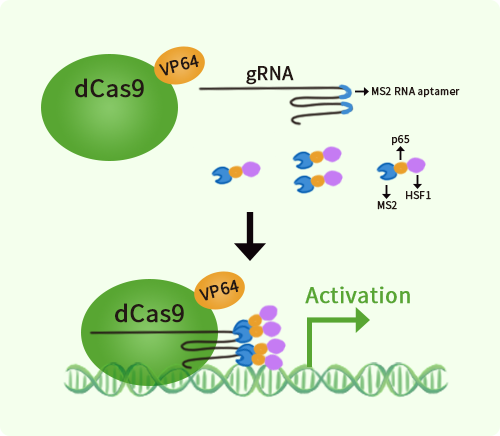Human HLA-DQB1 activation kit by CRISPRa
CAT#: GA102129
HLA-DQB1 CRISPRa kit - CRISPR gene activation of human major histocompatibility complex, class II, DQ beta 1
CNY 12,255.00
货期*
4周
规格
经常一起买 (2)
Specifications
| Product Data | |
| Format | 3 gRNAs (5ug each), 1 scramble ctrl (10ug) and 1 enhancer vector (10ug) |
| Symbol | HLA-DQB1 |
| Locus ID | 3119 |
| Kit Components | GA102129G1, HLA-DQB1 gRNA vector 1 in pCas-Guide-GFP-CRISPRa GA102129G2, HLA-DQB1 gRNA vector 2 in pCas-Guide-GFP-CRISPRa GA102129G3, HLA-DQB1 gRNA vector 3 in pCas-Guide-GFP-CRISPRa 1 CRISPRa-Enhancer vector, SKU GE100056 1 CRISPRa scramble vector, SKU GE100077 |
| Disclaimer | These products are manufactured and supplied by OriGene under license from ERS. The kit is designed based on the best knowledge of CRISPRa SAM technology. The efficiency of the activation can be affected by many factors, including nucleosome occupancy status, chromatin structure and the gene expression level of the target, etc. |
| Reference Data | |
| RefSeq | NM_001243961, NM_001243962, NM_002123 |
| Synonyms | CELIAC1; HLA-DQB; IDDM1 |
| Summary | HLA-DQB1 belongs to the HLA class II beta chain paralogs. This class II molecule is a heterodimer consisting of an alpha (DQA) and a beta chain (DQB), both anchored in the membrane. It plays a central role in the immune system by presenting peptides derived from extracellular proteins. Class II molecules are expressed in antigen presenting cells (APC: B lymphocytes, dendritic cells, macrophages). The beta chain is approximately 26-28 kDa and it contains six exons. Exon 1 encodes the leader peptide, exons 2 and 3 encode the two extracellular domains, exon 4 encodes the transmembrane domain and exon 5 encodes the cytoplasmic tail. Within the DQ molecule both the alpha chain and the beta chain contain the polymorphisms specifying the peptide binding specificities, resulting in up to four different molecules. Typing for these polymorphisms is routinely done for bone marrow transplantation. Alternative splicing results in multiple transcript variants. [provided by RefSeq, Sep 2011] |
Documents
Resources
| 基因表达相关资源 |
其它HLA-DQB1产品
Customer
Reviews
Loading...


 United States
United States
 Germany
Germany
 Japan
Japan
 United Kingdom
United Kingdom
 China
China

